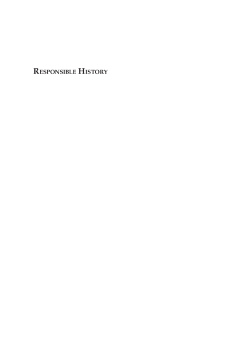
Additional Information
Book Details
Abstract
“I can warmly recommend Responsible History to any concerned historian in need of a reliable compass for responsible conduct. I endorse Voltaire’s words quoted in this book: ‘Those who can make you believe absurdities, can make you commit atrocities.’ Responsible conduct is necessary because irresponsible conduct is dangerous.” [From the Foreword.]
The abuse of history is common and quite possibly once more on the rise. Although this is well documented, there is no general theory that enables historians to identify, prove, explain, and evaluate the many types of abuse of history. In this book, the author, founder of the Network of Concerned Historians, presents such a theory. Reflecting on the responsible use of history, the author identifies the duties that the living has toward the dead and analyzes the rights to memory and history necessary to fulfill these duties. He concludes his powerful argument by proposing a code of ethics as a guide for responsible historians. This work is vital for any historian who wants to oppose and prevent the abuse of history.
Antoon De Baets, educated at the University of Ghent, Belgium, is a historian at the University of Groningen, the Netherlands. In recent years, he has written mainly on censorship of history and ethics of historians, including Censorship of Historical Thought: A World Guide, 1945–2000 (Greenwood Press, 2002). He co-ordinates the Network of Concerned Historians and has been published in seven languages.
“Antoon De Baets has [created] the most active platform devoted to compiling and denouncing cases of abuse and persecution of historians, defending human rights, and sensitizing the scientific community to those matters. In the present book, which provides a compelling summary of such initiatives, De Baets…draws very interesting and revealing conclusions for this fight against abusive history and in defence of human rights.” • Historiografias
“[The author] examines the fine balance between the interests of destruction and preservation of dictators’ archives and between disclosure and the right to silence and privacy, and the related but subtly different natures of historical and legal truth. His presentation of these matters makes for lively ethical thinking about how to be a responsible historian when the past becomes an area for conflict.” • Canadian Journal of History/Annales canadiennes d’histoire
“It is lucid, well-strung and yet not shorn of the scholarly bind and rigor: pleasant and compelling.” • Ranjan Ghosh, University of North Bengal, India.
